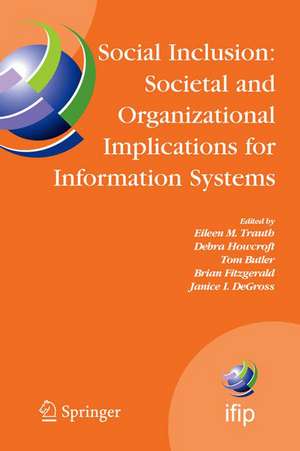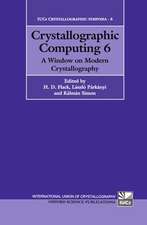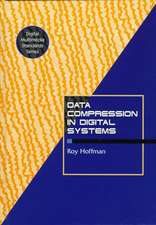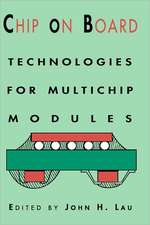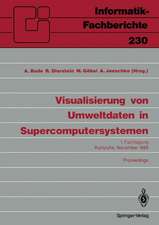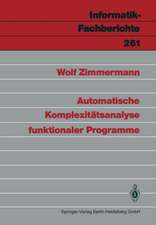Social Inclusion: Societal and Organizational Implications for Information Systems: IFIP TC8 WG 8.2 International Working Conference, July 12-15, 2006, Limerick, Ireland: IFIP Advances in Information and Communication Technology, cartea 208
Editat de Eileen Trauth, Debra Howcroft, Tom Butler, Brian Fitzgerald, Janice DeGrossen Limba Engleză Hardback – 15 iun 2006
This theme invites consideration of social and organizational constraints that result in the underrepresentation of certain groups and, by implication, certain issues. Likewise, it invites consideration of emerging technologies that have the potential to alter social, political, and economic relations. Much is being written about the ubiquitous nature of ICTs to change society, for example, open source software has recently emerged as a concept with implications far beyond the technology domain. This suggests that the role of ICTs in addressing social exclusion is far more complex than often thought. For this reason it is timely to expand our focus and progress the study of IS beyond the organizational level of analysis so that we may consider wider concerns affecting all citizens.
This book contains the proceedings of theWorking Conference on the societal and organizational implications for information systems of social inclusion. This conference, sponsored by the International Federation for Information Processing Working Group 8.2, was held in Limerick, Ireland, July 12-15, 2006.
| Toate formatele și edițiile | Preț | Express |
|---|---|---|
| Paperback (1) | 651.23 lei 6-8 săpt. | |
| Springer Us – 11 feb 2011 | 651.23 lei 6-8 săpt. | |
| Hardback (1) | 658.52 lei 6-8 săpt. | |
| Springer Us – 15 iun 2006 | 658.52 lei 6-8 săpt. |
Din seria IFIP Advances in Information and Communication Technology
- 20%
 Preț: 170.51 lei
Preț: 170.51 lei - 20%
 Preț: 615.74 lei
Preț: 615.74 lei - 20%
 Preț: 340.32 lei
Preț: 340.32 lei -
 Preț: 397.38 lei
Preț: 397.38 lei - 20%
 Preț: 336.02 lei
Preț: 336.02 lei - 20%
 Preț: 340.98 lei
Preț: 340.98 lei - 20%
 Preț: 503.41 lei
Preț: 503.41 lei - 17%
 Preț: 523.40 lei
Preț: 523.40 lei - 20%
 Preț: 502.06 lei
Preț: 502.06 lei - 17%
 Preț: 488.96 lei
Preț: 488.96 lei - 20%
 Preț: 501.04 lei
Preț: 501.04 lei - 20%
 Preț: 403.20 lei
Preț: 403.20 lei - 20%
 Preț: 2194.47 lei
Preț: 2194.47 lei - 15%
 Preț: 708.83 lei
Preț: 708.83 lei - 20%
 Preț: 1162.12 lei
Preț: 1162.12 lei - 20%
 Preț: 1288.25 lei
Preț: 1288.25 lei - 18%
 Preț: 1227.21 lei
Preț: 1227.21 lei - 20%
 Preț: 1282.00 lei
Preț: 1282.00 lei - 18%
 Preț: 1224.18 lei
Preț: 1224.18 lei - 18%
 Preț: 953.03 lei
Preț: 953.03 lei - 18%
 Preț: 953.20 lei
Preț: 953.20 lei - 18%
 Preț: 944.99 lei
Preț: 944.99 lei - 18%
 Preț: 948.29 lei
Preț: 948.29 lei - 15%
 Preț: 645.47 lei
Preț: 645.47 lei - 18%
 Preț: 960.13 lei
Preț: 960.13 lei - 20%
 Preț: 1288.11 lei
Preț: 1288.11 lei - 15%
 Preț: 645.79 lei
Preț: 645.79 lei - 20%
 Preț: 1271.10 lei
Preț: 1271.10 lei - 20%
 Preț: 1922.99 lei
Preț: 1922.99 lei - 20%
 Preț: 1285.97 lei
Preț: 1285.97 lei - 18%
 Preț: 956.69 lei
Preț: 956.69 lei - 18%
 Preț: 946.72 lei
Preț: 946.72 lei - 18%
 Preț: 1224.36 lei
Preț: 1224.36 lei - 20%
 Preț: 1277.89 lei
Preț: 1277.89 lei - 18%
 Preț: 953.03 lei
Preț: 953.03 lei - 18%
 Preț: 947.98 lei
Preț: 947.98 lei - 20%
 Preț: 1292.54 lei
Preț: 1292.54 lei - 18%
 Preț: 956.18 lei
Preț: 956.18 lei - 20%
 Preț: 645.79 lei
Preț: 645.79 lei - 20%
 Preț: 1284.47 lei
Preț: 1284.47 lei - 18%
 Preț: 1235.25 lei
Preț: 1235.25 lei - 20%
 Preț: 998.70 lei
Preț: 998.70 lei - 18%
 Preț: 949.23 lei
Preț: 949.23 lei - 20%
 Preț: 1283.81 lei
Preț: 1283.81 lei - 20%
 Preț: 995.89 lei
Preț: 995.89 lei - 18%
 Preț: 1231.01 lei
Preț: 1231.01 lei - 20%
 Preț: 993.09 lei
Preț: 993.09 lei - 20%
 Preț: 1288.94 lei
Preț: 1288.94 lei - 20%
 Preț: 987.17 lei
Preț: 987.17 lei
Preț: 658.52 lei
Preț vechi: 823.15 lei
-20% Nou
Puncte Express: 988
Preț estimativ în valută:
126.00€ • 131.91$ • 104.26£
126.00€ • 131.91$ • 104.26£
Carte tipărită la comandă
Livrare economică 05-19 aprilie
Preluare comenzi: 021 569.72.76
Specificații
ISBN-13: 9780387345871
ISBN-10: 0387345876
Pagini: 420
Ilustrații: XII, 420 p.
Dimensiuni: 155 x 235 x 24 mm
Greutate: 0.78 kg
Ediția:2006
Editura: Springer Us
Colecția Springer
Seria IFIP Advances in Information and Communication Technology
Locul publicării:New York, NY, United States
ISBN-10: 0387345876
Pagini: 420
Ilustrații: XII, 420 p.
Dimensiuni: 155 x 235 x 24 mm
Greutate: 0.78 kg
Ediția:2006
Editura: Springer Us
Colecția Springer
Seria IFIP Advances in Information and Communication Technology
Locul publicării:New York, NY, United States
Public țintă
ResearchCuprins
Social Inclusion and the Information Systems Field: Why Now?.- Economic Development and Geography.- Information Systems Practice for Development in Africa: Results from Indehela.- A Comparison of Factors Impacting ICT Growth Rates in Developing and Industrialized Countries.- American Discourses of the Digital Divide and Economic Development: A Sisyphean Order to Catch Up?.- Digital Inclusion Projects in Developing Countries: Value, Sustainability, and Scalability.- Political Participation.- Right on Time: Understanding eGovernment in Developing Countries.- Internet Voting: A Conceptual Challenge to Democracy.- Engaging Youths Via E-Participation Initiatives: An Investigation into the Context of Online Policy Discussion Forums.- Cybersolidarity: Internet-Based Campaigning and Trade Union Internationalism.- ICT Policies as a Means to Inhibit Social Exclusion: The South African Case.- Demographic Disparities.- Inclusion Through the Ages? Gender, ICT Workplaces, and Life Stage Experiences in England.- Space Invaders—Time Raiders: Gendered Technologies in Gendered UK Households.- Women and ICT Training: Inclusion or Segregation in the New Economy?.- Social Inclusion and the Shifting Role of Technology: Is Age the New Gender in Mobile Access?.- Web Accessibility: A Digital Divide for Disabled People?.- Ethical Issues.- Responsible Management of Digital Divides: An Oxymoronic Endeavor?.- Privacy, Security, and Transparency: ICT-Related Ethical Perspectives and Contrasts in Contemporary Firms.- Technology and its Consequences.- Developing Open Source Software: A Community-Based Analysis of Research.- Understanding Meaning and Bridging Divides: The Use of an African Metaphor for the South African Open Source Center.- Weblogging: Implementing Communities of Practice.- TakingPeople out of the Network: A Deconstruction of “Your Next IT Strategy”.- Institutions, Community, and People: An Evaluation of a Longitudinal Digital Divide Experience.- How (Can) Nonusers Engage with Technology: Bringing in the Digitally Excluded.- The Information Systems Profession.- To Vanquish the Social Monster: The Struggle for Social Inclusion among Peers in the Field of Systems Development.- Viewing Information Technology Outsourcing Organizations Through a Postcolonial Lens.- Methods as Theories: Evidence and Arguments for Theorizing on Software Development.- The Corporate Digital Divide Between Smaller and Larger Firms.
Textul de pe ultima copertă
Changes in society resulting from the pervasiveness of information technology have produced positive and negative, intended and unintended consequences. Key among them is the exclusion of individuals—who lack access to technological resources—from various societal processes and services. The theme of this book, social inclusion, explores the many dimensions of this exclusion. This issue has been the focus of much debate within the social sciences, yet has largely been underresearched in the Information Systems field, despite our concerns with the social and organizational aspects of technology. To the extent that contemporary debates have identified access to information as a key component of poverty, digital exclusion is seen as the problem. Thus, ICTs are portrayed as either exacerbating exclusion or are presented as the solution for greater inclusion. This conference will provide us with the opportunity to build upon our strong tradition of studying technology design and use in organizations, and expand our field of enquiry to consider the processes that engender social exclusion and the issues that derive from it.
This theme invites consideration of social and organizational constraints that result in the underrepresentation of certain groups and, by implication, certain issues. Likewise, it invites consideration of emerging technologies that have the potential to alter social, political, and economic relations. Much is being written about the ubiquitous nature of ICTs to change society, for example, open source software has recently emerged as a concept with implications far beyond the technology domain. This suggests that the role of ICTs in addressing social exclusion is far more complex than often thought. For this reason it is timely to expand our focus and progress the study of IS beyond the organizational level of analysis so that we may consider wider concerns affecting all citizens.
This book contains theproceedings of the Working Conference on the societal and organizational implications for information systems of social inclusion. This conference, sponsored by the International Federation for Information Processing Working Group 8.2, was held in Limerick, Ireland, July 12-15, 2006.
Eileen M. Trauth is at The Pennsylvania State University, USA; Debra Howcroft is at the University of Manchester, UK; Tom Butler is at University College Cork, Ireland; Brian Fitzgerald is at the University of Limerick, Ireland; and Janice I. DeGross is at the University of Minnesota, USA.
This theme invites consideration of social and organizational constraints that result in the underrepresentation of certain groups and, by implication, certain issues. Likewise, it invites consideration of emerging technologies that have the potential to alter social, political, and economic relations. Much is being written about the ubiquitous nature of ICTs to change society, for example, open source software has recently emerged as a concept with implications far beyond the technology domain. This suggests that the role of ICTs in addressing social exclusion is far more complex than often thought. For this reason it is timely to expand our focus and progress the study of IS beyond the organizational level of analysis so that we may consider wider concerns affecting all citizens.
This book contains theproceedings of the Working Conference on the societal and organizational implications for information systems of social inclusion. This conference, sponsored by the International Federation for Information Processing Working Group 8.2, was held in Limerick, Ireland, July 12-15, 2006.
Eileen M. Trauth is at The Pennsylvania State University, USA; Debra Howcroft is at the University of Manchester, UK; Tom Butler is at University College Cork, Ireland; Brian Fitzgerald is at the University of Limerick, Ireland; and Janice I. DeGross is at the University of Minnesota, USA.
Caracteristici
Most current research on the negative and positive consequences of the pervasiveness of information technology in society Includes supplementary material: sn.pub/extras
